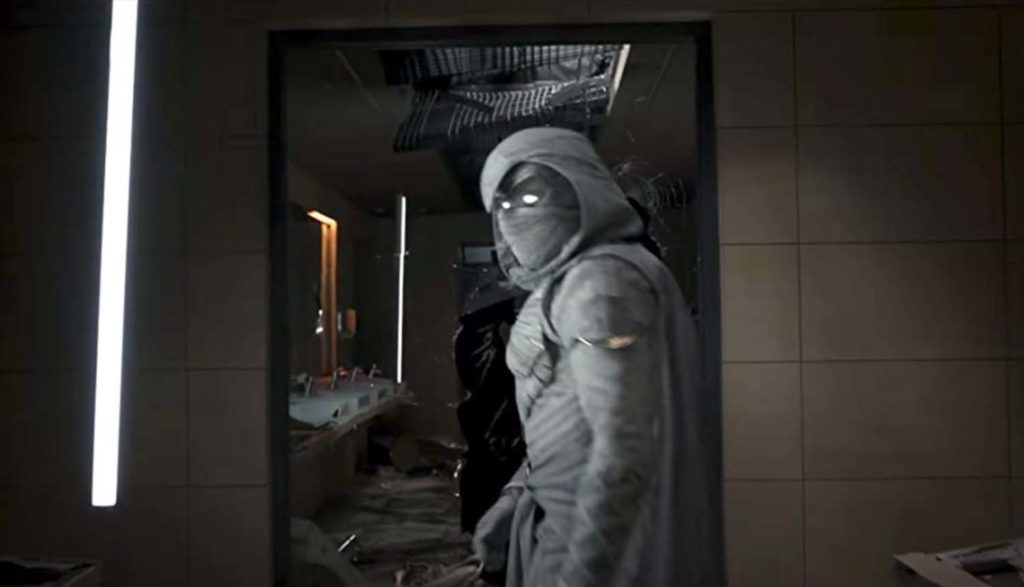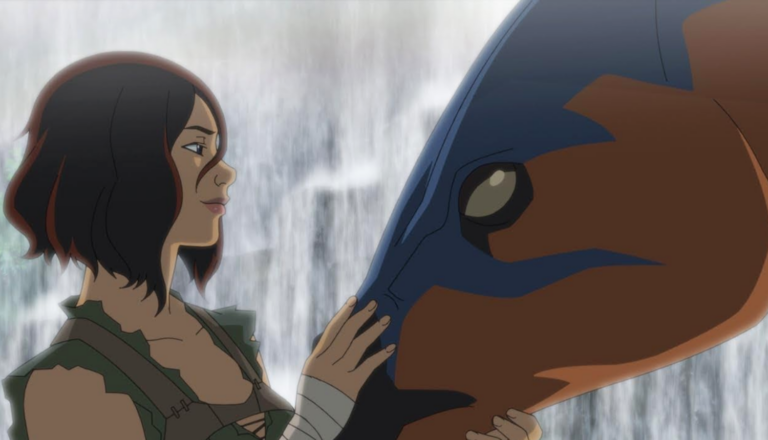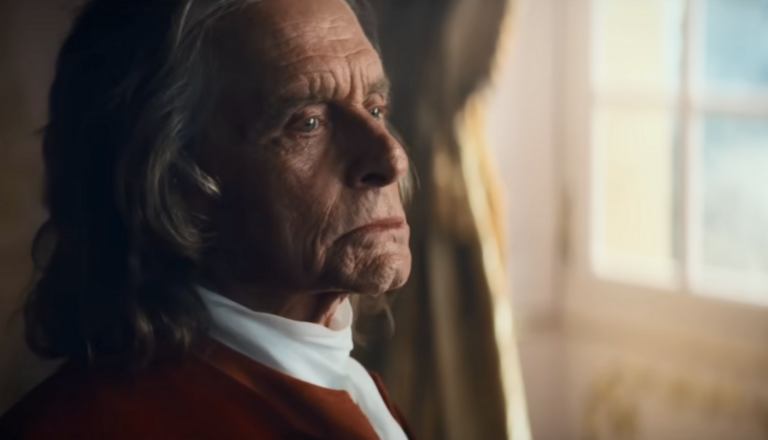
Dora
Say hola once again to the iconic explorer in this faithful reboot of the children’s series.

Some people hate to be alone. Steven Grant would love it.
Steven—a mild-mannered “gift shop-ist” at a London museum—has had far too much company lately.
At first Steven thought he was just suffering from a serious sleeping disorder. He’d wake up and find himself in streets, towns, even whole countries with no memory of how he got there. Sometimes he’d even lose track of whole hours when he was awake, too. And vanishing for hours at a time is not the best way to make a good impression on your supervisor.
But what Steven thought was an extreme case of sleepwalking proves to be much, much worse. He’s sharing his head space with a violent mercenary (and maybe others) and hanging out with a fearsome Egyptian god.
Or is he? Because while you can’t trust Egyptian gods further than you can throw them, sometimes your very own mind isn’t as trustworthy as you’d like, either.
The deity that apparently dove headlong into Steven’s life is Khonshu, Egyptian god of the Moon. He’s also surprisingly active in the affairs of mortals, doing his best to protect the innocent and vulnerable whenever he can. You could say he, um, moonlights as a philanthropic immortal.
But don’t mistake the guy as an ol’ softie. Those who hurt the innocent and vulnerable are subject to Khonshu’s “Fist of Vengeance.” And that fist, it seems, is wielded by his earthly avatar. While he’s had plenty of avatars over the millennia, his current lethal servant is a guy named Marc Spector, a former mercenary paying off a sizable debt to Khonshu by doing his bidding. Not a great way to make a living, but Marc figures it’s better than the alternative.
That makes Marc (in Marvel’s eyes, at least) a superhero—even if Marc is, in many ways, far from heroic. And if we know anything about superheroes, it’s that most of ’em live double lives. Superman pretends to be Clark Kent. Bruce Wayne is really Batman. Peter Parker … you get the idea. But in Marc’s own alter ego is extreme, even by superhero standards. Steven never even knew that Marc existed, much less took over his body to obliterate evildoers.
But ever since Marc suffered an emotional trauma in his own reality, the walls between him and Steven have been crumbling. Both are now quite aware of each other’s presence, and that makes things wildly inconvenient for each man. And let’s not even speak of the invisible Egyptian demons that seem all too eager to eviscerate our humble gift shop-ist.
But they’ve got to somehow work together. That scarab points to the crypt of another Egyptian deity—the crocodile-headed Ammit—who would love to preemptively slaughter millions of people before they have a chance to do something bad. Her own earthly servant, Arthur Harrow, knows how to resurrect the goddess—and he wants to bring about this “cleansing” catastrophe in the worst sort of way.
Unless Arthur isn’t quite the person whom Steven thinks he is. Perhaps Steven and Marc have the whole thing quite wrong. And when your mind is as fractured as their shared gray matter is, it’s hard to know exactly what’s broken … and what’s not.
Iron Man’s gone. Captain America’s shield has changed hands. But Marvel still has stories to tell and money to make. So it and its corporate overlord, Disney, continue to dip into the company’s deep bag of superheroes. And the ones they pluck these days just get weirder … and more problematic.
Moon Knight, with the titular character played by A-list actor Oscar Isaac, is certainly an intriguing addition to the Marvel Cinematic Universe. The show (labeled a limited miniseries, which suggests perhaps just a one-season run) brings us a hero broken into two parts: The capable-but-ruthless Marc and the sweet-but-confused Steven. Other parts may lurk beneath the surface, too. The setup allows for some clever storytelling, good acting and the exploration of deeper themes related to heroism, identity and just what “doing good” really looks like.
But this is also Disney+’s most problematic television foray into the MCU.
First, the theological problems.
Sure, we’ve seen lowercase-g gods in the MCU’s television branch before. Loki (who starred in his own show) is the self-styled Norse “god of mischief,” after all. But these gods are intended to be god-like (in contrast to Loki’s humbling storylines and often “puny god” status).
Moreover, these gods—even the supposedly justice-seeking Khonshu—can be pretty terrible folks. And while perhaps some might take comfort in the fact that these Egyptian deities could never hope to be a substitute for a Christian understanding of God, we’d then have to deal with this discomforting fact: Our titular, heroic Moon Knight is serving an entity that can look and feel diabolical at times. And Marc’s and Steven’s relationship to each other can feel like possession as well.
Now, this spiritual element comes with some possible caveats as we hit the series’ midway point. But even if Moon Knight viewers can work through (or wave away) those concerns, the show tosses us others. The violence is probably the harshest we’ve seen in an MCU made-for-TV story. Language can get pretty foul, too: The s-word makes frequent audio appearances, as do a raft of profanities perhaps more shocking to those across the pond (including “b–locks” and “b–ger”.)
Ancient Egyptian tombs often contained curses—words of warning written to whoever might disturb the contents therein. Moon Knight is a tomb of a different sort. Sure, as the story goes on, we might find a thematic trinket or two. But this show, it seems, comes with its own sort of curses.
Layla frees Khonshu from his stone idol prison. But Arthur Harrow has freed Ammit, too, and without an avatar like Marc/Steven (who technically died a couple of episodes ago), Khonshu’s fairly helpless. But all is not lost: Marc escapes one version of the afterlife to rescue Steven from another. And together, with a little help from Khonshu, the two jump back in business.
The episode is filled with Egyptian gods and their avatars. Ammit and Khonshu fight in and around a giant pyramid. (The crocodile-headed Ammit tells Khonshu that, “for a god, you are low on faith.”) Layla (Marc’s wife) becomes a temporary avatar for Taweret, the hippo-headed goddess of women and childbirth. (Tawaret takes over a couple of dead bodies to communicate with the living, as well.) Some mortal avatars are killed. Someone becomes the unwilling container for a trapped deity. Ammit swallows the souls of seemingly hundreds of people “judged” (and killed) by her followers. Tawaret tells Layla that she met her father in the Egyptian afterlife.
Loads of people die by supernatural means. Others are killed more traditionally—a few via Moon Knight’s moon-shaped blades, several others by another apparent personality lurking inside Marc/Steven’s body. Someone is nearly thwacked in the head with a hatchet. People are shot at, and some presumably die from bullets. Someone walks around with bloody footprints. Characters say “h—” three times and use the British profanity “b–locks.”
After Episode 4’s game-changing events, Marc finds himself in a psych ward getting treatment from Arthur Harrow—not Arthur the cult leader, but Arthur the shrink. The doctor is working to “break down the walls between you and Steven.” But Marc and Steven apparently still have work to do outside that psych ward, too. The two—now conveniently separated in both body and mind—ride a boat through a sandy portion of the Duat, (the Egyptian concept of the afterlife), one piloted by the Egyptian hippo-headed goddess Taweret. The goddess tells them that they must balance their souls before they hit the Sea of Reeds (the afterlife’s more heavenly realm). Otherwise, both of them will be claimed by the dead of the Duat.
The narrative threads are quite different, of course, and it’s still an open question as to which one (if either) is “real.” Both, however, are built around healing Marc/Steven’s broken psyche.
Taweret tells Marc and Steven that they’re sailing through “an afterlife, not the afterlife,” she says. “You’d be surprised how many intersectional planes of untethered consciousness exist.” They make their way to the Gates of Osiris (another Egyptian deity) in an effort to intersect another plane and stop Ammit from judging souls. Along the way, we also discover that Marc is Jewish, and we see flashbacks to Jewish shivas (a formalized time of mourning when someone dies).
We see how Marc and Steven became two separate identities—one that involves a great deal of childhood trauma, an unforgiving and abusive parent and an unexpected death. (The parent beats the boy, off camera, with a belt.) Steven punches Marc in the face.
A cafeteria is filled with mutilated dead bodies—victims of Marc when he served Khonshu as the god’s “Fist of Vengeance.” (Though Marc says that these victims were murderers and predators—the “worst of the worst”—he also admits that he “kept wishing I’d fail and one of them would kill me instead.”) In flashback, we’re taken to the scene of a massacre perpetrated by Marc’s mortal mercenary partner: One of those victims was Marc himself. The bullet-riddled and bleeding Marc drags himself into Khonshu’s temple and prepares to kill himself. Khonshu materializes and convinces him instead to serve as his avatar.
Dead souls (depicted as people made of sand, in a sense) attack Marc and Steven, and several are dispelled. Someone falls into the sand and freezes in place there. Marc contemplates killing Taweret and stealing her boat to stop Ammit.
Marc is forcibly injected by Arthur’s workers. When Marc revives, Arthur lies about drugging him. Someone appears to drink heavily. Characters say “h—” and “d–n,” as well as British profanities “bloody” and “b–locks.” God’s name is misused about seven times.
Khonshu has been imprisoned, and Steven/Marc have subsequently lost the god’s super healing suit. But he and Layla are still determined to stop Arthur Harrow from freeing Ammit from her own stony prison. That will involve plenty of mental, emotional and physical peril for them both.
Most of the action takes place in the tomb where Ammit’s essence is stored. A mummy-like creature has been waiting for new (ahem) friends for ever so long, and some of Arthur’s cult members become the monster’s unlucky playmates. The central tomb is filled with fresh blood and, in Steven’s words, “meaty bits.” Jars are shellacked with the blood, a smeared trail of crimson leads into parts unknown, and bullet shell casings litter the tomb floor. The mummy drags someone into the tomb and kills him on the spot—apparently cutting the man open and removing his entrails, bit by meaty bit. In a fight with the monster, a human combatant rips off the mummy’s hand (leaving a jagged piece of bone visible in the arm—which the mummy uses as a weapon), but eventually the mummy is overcome after being jabbed in the eye socket with a flare and is tossed into a deep pit.
Henchmen get hacked at with an ancient hatchet (which ends embedded in someone’s chest). Other people are shot, and some apparently die. Steven reaches into the mouth of a mummy (breaking the jawbone off as he does) to pull something from the corpse’s gullet. Steven punches himself in the face and falls from a pretty significant height. A movie-prop skeleton makes an appearance. People are hit (at least once in the groin) and bitten. Ammunition is set on fire and explodes, ending some bad-guy pursuit (and possibly ending the bad guys’ lives). We hear about the past slaughter of a group of archeologists.
Khonshu, Ammit and other Egyptian gods are apparently imprisoned in stone idols, each less than a foot high. (Many rest in alcoves backed by ever-burning candles). We see an apparent goddess (who appears to be a woman with a hippopotamus head). We hear someone speak of Coyolxauhqui, the “lunar god of the Aztecs.” Someone quotes a movie line that goes, “No tree can ascend to the light of heaven unless it descends to the depths of hell.” Steven sees a set of stone sphinxes and references a Greek myth involving a sphinx and a riddle. We hear other references to Egyptian gods.
Steven kisses Layla. Layla straps a harness onto Steven’s legs and midsection (much to Steven’s delight). Someone is drugged after becoming violent. Characters say the s-word once, “h—” once and the British profanity “bloody” three times. We also hear four misuses of God’s name.
With Arthur in possession of the scarab (which reveals the location of Ammit’s tomb), he and his posse are in Egypt now, tracking down his patron deity’s whereabouts. But he’s not alone: Marc/Steven is in Egypt, too, as is Marc’s wife, Layla. They hope to find another way to find Ammit’s resting place (and thus locate Arthur’s cult). But that “other way” may be more perilous, and costly, than any of them suspect.
Marc and Khonshu ask for help from other members of Egypt’s divine pantheon. The other gods and goddesses also come in the guise of their earthly avatars, and they’re none-too-pleased that Khonshu (who’s apparently on the outs with the club) is asking for help. Nevertheless, they bring in Arthur for a makeshift trial, who tells the assembled deities that he’s not doing anything wrong; Khonshu’s blinded by jealousy, and his avatar is seriously troubled, Arthur alleges. (Marc admits to the latter.) The pantheon threatens Khonshu with imprisonment if he oversteps again. [Spoiler Warning:] And when the god of the moon does (in the other gods’ eyes) overstep, the deities assemble again and transfer Khonshu’s essence into a stone idol. Magic words are chanted there and elsewhere.
Marc talks with the mortal avatar of Hathor, goddess of music and love. She mentions that Hathor and Khonshu were definitely close in the old days, euphemistically telling Marc that “Khonshu enjoyed Hathor’s melodies.” Marc and Layla also seem to be on the edge of talking over old grievances and patching things up, but those efforts come—so far—to naught. A man rides a horse shirtless.
Marc and Steven may be sharing their body with yet another interloper: Both seem to black out at one point. When Marc wakes, he discovers he’s holding a knife, and two people lie stabbed to death nearby.
Marc fights with a number of folks. At one point, Marc (dressed in his regenerative Moon suit) is speared and skewered several times, the points being rammed through his hands and legs and shoulders and midsections. (The spears sometimes impale others who aren’t so fortunate as to be wearing a super-healing suit.) He also uses the metal crescent moons attached to the suit’s chestpiece to stab and skewer some opponents. Layla also uses an apparent bit of jewelry as a shoulder-skewering weapon. Marc fights, san suit, with other bad guys, too—some of whom bear knives, guns or other weapons. The fights involve many tooth-rattling punches and kicks.
A man commits suicide, saying “praise Ammit” as he falls to his death. Arthur admits loving to have caused pain on behalf of Khonshu when he served the god.
Characters use the s-word four times. We also hear “d–n” and “p-ss.”
Steven has lost his job, but it wasn’t his fault. See, this hideous demonic jackal demon attacked him, and his body was taken over by another … person? Force? Anyway, it wasn’t his fault that he tore up the museum’s bathroom: It was the other guy. Who possessed him. While beating up a demonic jackal demon.
While the story wouldn’t likely fly with the museum’s human resources department, it’s true. And as Steven tries to make sense of this new, strange stage of his life, he learns that the man who occasionally possesses his body is Marc Spector, a former mercenary who (for reasons we don’t fully understand) is serving Khonshu, the Egyptian god of the moon. Turns out, Marc is married, too—though Steven seems to have more in common with Marc’s wife, Layla, than Marc does. Steven is also formally introduced to the show’s apparent villain: Arthur Harrow, who serves the Egyptian goddess Ammit. He hopes that, by resurrecting the goddess, she’ll bring an end to much of the world’s suffering … by eliminating everyone who might contribute to it.
We hear a great deal of discussion about Egyptian deities and their conflicting motives. While Ammit seems to be Moon Knight’s Big Bad, Khonshu is no grand fellow, either. His head looks like that of a massive skeletal vulture, and we’re told that Khonshu often lies. He seems to threaten Marc, too—promising to claim Layla as his next avatar if Marc fails to fulfil his obligations. Steven asks Marc if he’s a demon or possessed.
Marc/Steven fight with a monster (who is invisible to most). Both man and beast suffer quite a bit of damage, but the creature is eventually dispatched after being impaled on a spike. Using Ammit’s power, Arthur kills a homeless man and talks about potentially killing many, many others, including children. While he robes this in the guise of a positive outcome (given that those who die would commit evil acts later in their lives), Steven says that his own morality wouldn’t allow him to go so far. “I kind of draw the line at child murder,” he says. (He also alleges that a “thought can’t be evil,” though the Bible would disagree.)
Other fights take place. Khonshu tells Steven to kill Arthur. “Break his windpipe!” the Egyptian god thunders. We hear about an atrocity that Marc allegedly committed several years before.
Characters use the s-word five times. We also hear “h—” and a few uses of the British profanity “bloody.” God’s name is misused nine times, and Jesus’ name is abused once.
Steven Grant isn’t doing well. He sleepwalks so much that he tethers himself to his bed. He blacks out for hours sometimes. He hears strange voices in his head. And recently, he dreamed he’d been in an entirely different country—where people kept trying to kill him.
But when a person from his dreams shows up at his place of employment, and a demon hound then chases him through its halls—only dispatched when his body is taken over by another (much more violent) personality—well, Steven knows his problems might be just beginning.
That other personality, Marc Spector, is indeed violent—and lethally so. The camera doesn’t capture most of the violence (just as Steven also remains unaware) he uncorks, but we see the aftereffects: Dead bodies lie at a mystified Steven’s feet. An assailant is propped up against the inside of a van, a bloody bullet wound in his head. (The body later tumbles out onto the road.) We do see, however, that demon dog beaten to death (though the actual blows are shielded from the camera as well).
We see Marc/Steven’s patron Egyptian deity, Khonshu, at times. He sports a gigantic, skeletonized vulture head and is pretty terrifying. (He often refers to Steven as the “idiot” and “parasite”).
Another man serves a rival Egyptian deity, and through that service has the power to kill people (deemed sinful and unworthy by the goddess) with a touch. One woman collapses after the man holds her hand, apparently rapidly aging to her doom. A set of scales tattooed on the man’s forearm reveal who’ll live or die—a reference to the Egyptian myth of the Hall of Judgment. (People’s hearts were weighed against a “feather of truth” to determine whether they were good or bad in life. Hearts deemed bad were fed to the goddess Ammit and thus forever obliterated.)
When Steven tells a schoolgirl visiting the museum about Egyptian afterlife myths, including the heavenly Field of Reeds, the girl asks, “Did it suck for you, getting rejected in the Field of Reeds?” (It’s a nod to Steven’s alter-ego and, perhaps, his origin story—which in the Marvel comics involves Marc being resurrected by Khonshu.) A man smashes a glass and fills his shoes with the shards. He then puts his feet in the shoes and walks.
We see images of and hear references to other Egyptian gods and goddesses, and a villain says that the goddess he serves wants to make “Earth as much like heaven as possible.” We hear Bob Dylan’s Christian-tinged “Every Grain of Sand” playing in the background. Steven talks about how Egyptians removed most of the organs of a dead person before mummification—including using a hook through the nostril to remove the brain. Steven falls to the ground after what he thinks is a terrifying dream. People shoot guns and drive recklessly on the road. A couple of bad guys are crunched by falling logs. A museum exhibit feature a couple of neanderthals (which some might see as a nod toward evolution).
Characters say the s-word once and a few milder profanities, such as “a–” and “h—.” More prevalent are British swear words, including “bloody,” “b–locks” and “b–ger.” God’s name is misused nearly 20 times.


Paul Asay has been part of the Plugged In staff since 2007, watching and reviewing roughly 15 quintillion movies and television shows. He’s written for a number of other publications, too, including Time, The Washington Post and Christianity Today. The author of several books, Paul loves to find spirituality in unexpected places, including popular entertainment, and he loves all things superhero. His vices include James Bond films, Mountain Dew and terrible B-grade movies. He’s married, has two children and a neurotic dog, runs marathons on occasion and hopes to someday own his own tuxedo. Feel free to follow him on Twitter @AsayPaul.

Say hola once again to the iconic explorer in this faithful reboot of the children’s series.

Based on a popular video game, Ark: The Animated Series features hungry dinosaurs, bloodthirsty people and plenty of problems.

Other than an occasional eyeroll or some mild toilet humor, Bluey is light and clean.

Apple TV+’s Franklin takes a look at one of our most interesting Founding Fathers—and it’s in no way appropriate for the classroom.